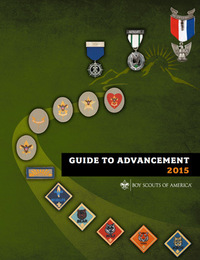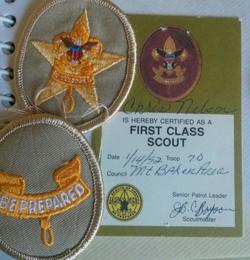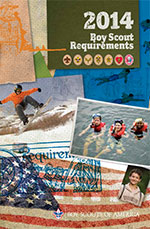 The BSA’s Advancement Team has completed its biennial review and revision of the Guide to Advancement. The complete document can be downloaded here. As usual, there are several significant changes and clarifications, and most of the changes pertain to the Boy Scout program. Here’s a summary: Continue reading “Guide to Advancement updated”
The BSA’s Advancement Team has completed its biennial review and revision of the Guide to Advancement. The complete document can be downloaded here. As usual, there are several significant changes and clarifications, and most of the changes pertain to the Boy Scout program. Here’s a summary: Continue reading “Guide to Advancement updated”
Scouts who are not advancing
 I got an e-mail from a reader:
I got an e-mail from a reader:
I’m the advancement coordinator for our troop. Recently I was running the “Scouts Not Advancing” report in Troopmaster and noticed that we have a good number of Scouts who haven’t advanced in rank in 18 months or more. One of our committee members told me that an assistant Scoutmaster used to collect the Scouts’ books, went through them to see what hadn’t been signed off, then told the PLC what requirements were missing to try to get the Scouts to help others advance. What is the best way for the committee to help move advancement along? Should we have some of the older Scouts work with the younger ones to get requirements done? How about a troop meeting where we have a session with sign-off stations?
This is an issue that seems to come up frequently. While some Scouts advance quickly through the ranks, others seem to lag behind for one reason or another, and it sometimes makes the adult leaders wonder how to help them catch up. Continue reading “Scouts who are not advancing”
Follow my friends
 I’m truly fortunate to have so many readers and followers here on Bobwhite Blather. I get a little kick out of seeing visitor statistics, a new follower on Twitter or a subscriber to the e-mail list. It’s good to know that my fellow Scouters are finding value in what they find here, and keep coming back.
I’m truly fortunate to have so many readers and followers here on Bobwhite Blather. I get a little kick out of seeing visitor statistics, a new follower on Twitter or a subscriber to the e-mail list. It’s good to know that my fellow Scouters are finding value in what they find here, and keep coming back.
There are many other Scouters who write for the world-wide web. You’ve probably discovered that you can find a lot of information on almost every conceivable Scouting topic.
But how can you tell which ones follow the first point of the Scout Law – trustworthy?
As our disclaimer reads, this blog isn’t to be construed as official information. That can come only from the Boy Scouts of America directly, and their several websites (chiefly scouting.org) provide the canonical reference on all things Scouting.
But many others are reliable sources, interpreting Scouting in line with official policy and traditional methods, and critical of those who would reinvent Scouting to advance their own ideas of what it’s all about. Continue reading “Follow my friends”
Whose advancement is it, anyway?
 A friend in a nearby troop sent me the following:
A friend in a nearby troop sent me the following:
I was talking with a former Scoutmaster of our troop about how we have some Second-Class and Tenderfoot Scouts who would like to take part in a high adventure activity offered by our council which permits only First-Class Scouts and above. He mentioned:
“If we move the younger Scouts to First Class, they can go on the hike as crew members. In the past, the assistant Scoutmasters and I kept a list of the requirements each boy needed so when we met with the PLC we could help them decide what skills the troop should focus on in meetings and campouts. The boys didn’t know about the list, but it was helpful because of our aim to help the Scouts make First Class in the first year.”
This sounds like a good idea. It would help get them to First Class faster and let them experience our high adventure trek. What do you think?
No more, no less
 What if a high school math teacher decided that during her geometry class she would start teaching her students about calculus?
What if a high school math teacher decided that during her geometry class she would start teaching her students about calculus?
What if questions about calculus appeared on the course midterm or final exam?
In the first instance, the teacher could be trying to show her students that what they’re learning – in what to some may be a pointless geometry class – is of value further along in the spectrum of mathematics. After all, calculus does rely on many of the concepts learned from geometry.
But in the second case, the teacher is clearly out of bounds for expecting that her students should demonstrate some proficiency in limits, differentials or integrals – subject matter that isn’t required by the geometry curriculum.
Yet there are some in Scouting who apply the same practices with our Scouts. Continue reading “No more, no less”

